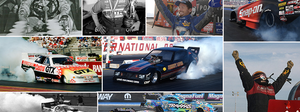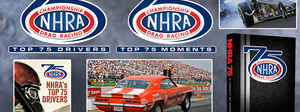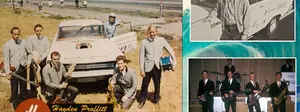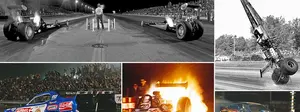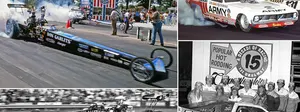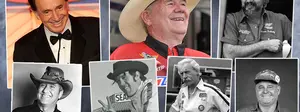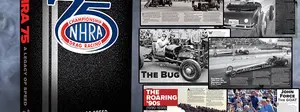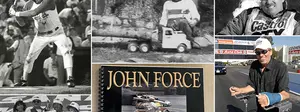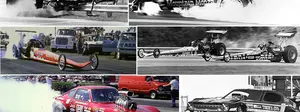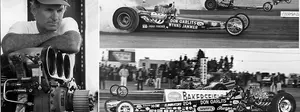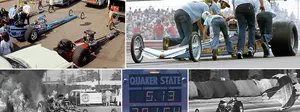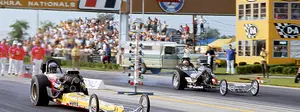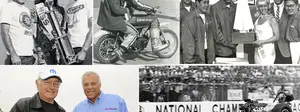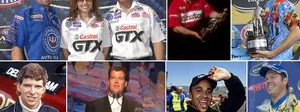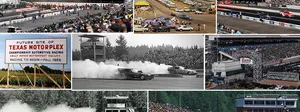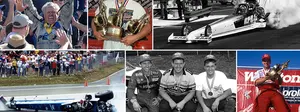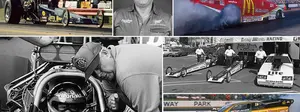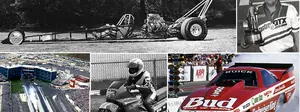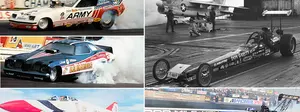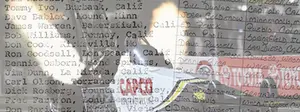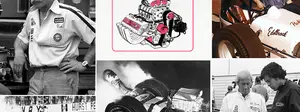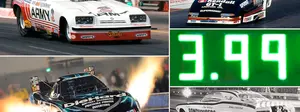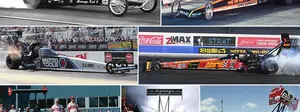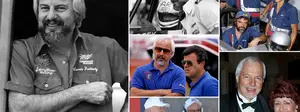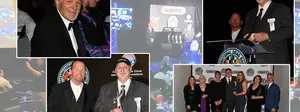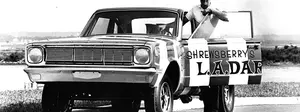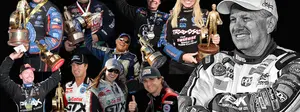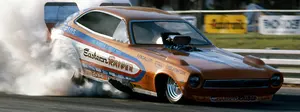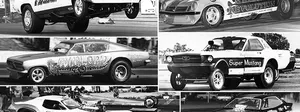Fan Fotos: West Coast pits
 |
If you've read drag racing magazines for any amount of time, the name Cliff Morgan should be familiar to you as a regular contributor to various "letters to the editor" columns, including in National DRAGSTER. A drag racing fan since the early 1960s, he has a very deep and wide knowledge of the sport that he's quick to share, and he has been a regular correspondent to me since I began this column, so it was only natural that he'd want to participate in our Fan Fotos features.
Born in 1946, Morgan attended his first drag race in his teens, in 1961 at San Fernando Raceway, and went to Lions and once to the old San Gabriel drags before it closed.
After serving in the Air Force from 1964 to 1968, he became a regular at Lions, Fernando, and Orange County Int’l Raceway, which then was fairly new.
"So many memories, and I saw so much history," he said. "Don Garlits, my hero and favorite driver. I saw the accident that cut off part of his foot. I thought he'd been killed. A year later, he came out with the "back motor" car, and it ran straight. I saw Garlits at Ontario when he ran that 5.63/250. I moved to Arizona in 1981 and got to see the last AHRA Winternationals at the old Tucson Dragway; also the last AA/FA Nationals there. I started going to Firebird when it opened. I remember being so happy to see Firebird when it was new; it reminded me a lot of OCIR. I like Firebird a lot and also Speedworld [Dragstrip], the other track in Phoenix. It was built in 1963 and reminds me a lot of 'the old daze.' I have so many memories of the drags. Next to the Lord, it's my greatest passion. I've really been blessed to see so much history in the making."
Morgan sent me an envelope packed with his original photos with nice captions on the back of each to get me pointed in the right direction. "I didn't know what to send, so I tried to send something maybe a bit out of the ordinary," he cautioned. "I'm gonna send way too many photos, so you are gonna have to decide what you wanna show."
His caveat definitely rang true when I sorted through the images and made up my final 10. I've mostly gone away from the tried and true photos of cars on the track to show some of the neat stuff that Morgan found in the pits as well. For me, shooting interesting things in the pits can be as challenging as shooting cars at speed, and Morgan had a nice knack to capture some cool images. What's even cooler to me (and I think to Morgan when he sees them here) is that by scanning the images and cleaning them up a little, I was able to reproduce them here at sometimes double their printed size to show more detail. Here they come …
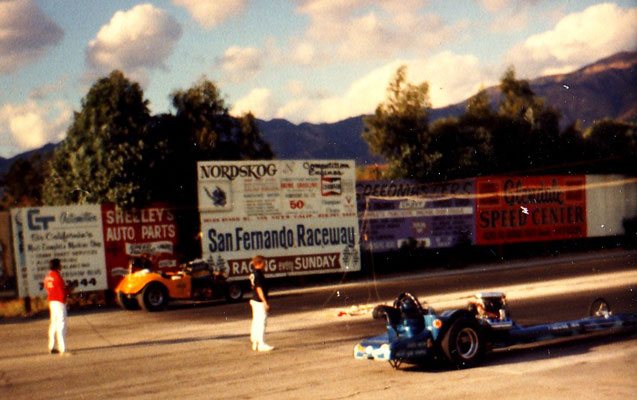 |
This is "the Pond" — San Fernando Raceway — in December 1968, and it shows Larry Dixon Sr. (father of the two-time Top Fuel champ) pitting his famed Fireside Inn AA/Modified Fuel Roadster, near lane, against George "Stone Age Man" Hutcheson in the similarly motivated 392-powered Rat Trap AA/Fuel Altered in what Morgan says was a race contested in Top Fuel. Morgan also recalled that earier in the day Hutcheson had set a new AA/FA track record of 7.99. This is the only on-track photo in the batch I selected, but the track holds special meaning to Morgan, hence its inclusion.
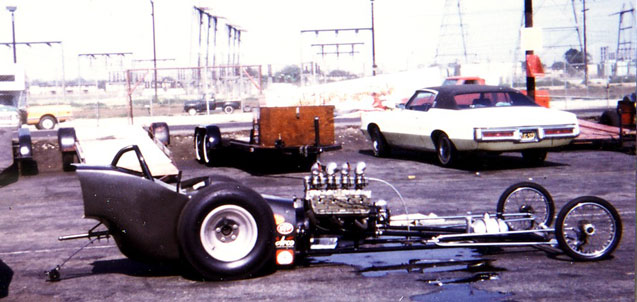 |
"This little car has its place in drag racing history," notes Morgan. The pit area here should be instantly recognizable to Lions veteranos, but maybe not the car, a flathead-powered little rail captured on a clear July 1970 day at "the Beach." Morgan couldn’t remember the name of the guy who owned the car, which ran as a bracket car, but remembers who did drive it once: Don Garlits. "The night before Garlits' accident [in January 1970], Garlits drove this car in a match race against George Hutcheson, who also was driving a flathead-powered car. Garlits won, and the announcer made a big deal about Garlits being back in a flathead after so many years." Wow, who knew?
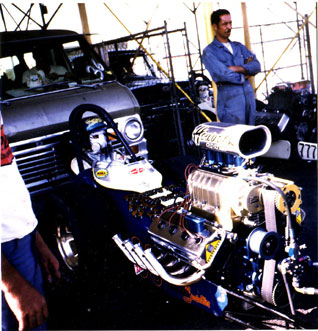 |
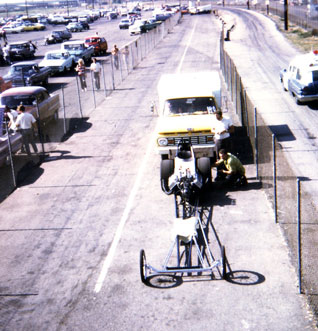 |
Here's another couple of pics from Lions in July 1970. The photo above left shows what Morgan IDs as Walt Stevens' Gas gas dragster waiting under the tower at Lions to make its run. The photo above right shows the staging lanes for the "hot" (i.e., push-start) cars with the regular staging lanes to the left of the photo.
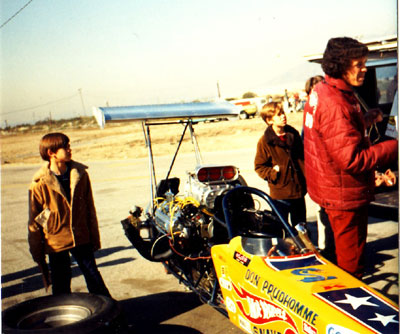 |
This, of course, is "the Snake," Don Prudhomme, with two adoring young fans hanging nearby, perhaps waiting for an autograph. Been there, done that.
This is Irwindale, in January 1973, and the car is Prudhomme's famed Kent Fuller-built "Yellow Feather" Top Fueler, so named because of its extreme light weight, which, as I recall from a magazine feature I once read, was partially achieved by drilling holes in just about every flat surface on the car. It reportedly weighed less than 1,200 pounds, and although it ran like stink, I read that Prudhomme eventually shelved it later due to safety concerns.
Morgan points out how cool the pits were back then: "Everything done in the open ... no 18-wheelers, etc." You could pretty much walk around three sides of a car being worked on (the trailer representing the fourth side); unlike today, when you mostly get to see the cars from behind.
"I wonder how old those two boys are now," mused Morgan of the pic he took more than 35 years ago. "Late 40s?"
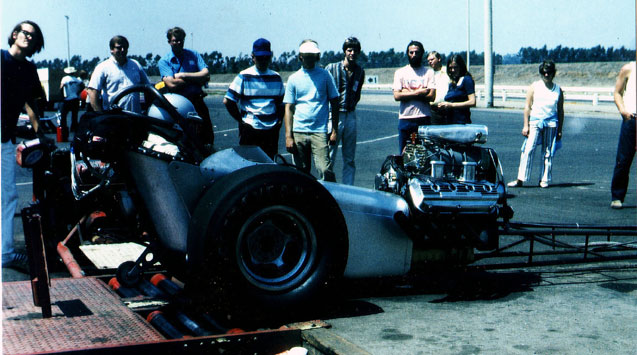 |
Our tour of Southern California raceplants continues with this neat shot of an unidentified fueler on the roller starters at Orange County Int’l Raceway Aug. 15, 1971. "This is how you warmed up your car at OCIR," wrote Morgan. "The car was positioned on the rollers, and the rollers were hooked up to a small-block Chevy motor. The rollers spun the tires, and the driver let out the clutch and the motor started. The front wheels were held in place by a plate or some device (vague memories), sometimes also by crewmen. Once the motor was lit, the rollers were stopped and the car idled off to its assigned pit space."
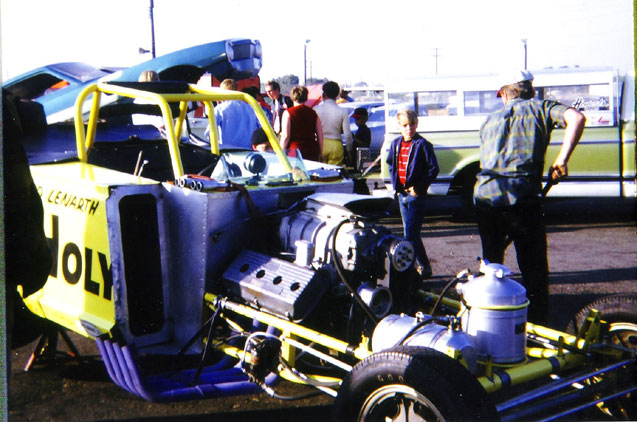 |
I've seen plenty of pics of Ed Lenarth's Holy Toledo Jeep (known affectionately as "The Brick" for its less than aerodynamic profile) on the track but never in the pits with the front clip removed so that we could see the 392 powerplant. This car was the follow-up to the original Lenarth Jeep, the rather primitive Roger Wolford-driven Secret Weapon, and was built by Lenarth with Brain Chuchua, who owned a huge Jeep dealership in Southern California, with all the best parts. Still, aero woes held it to a best of just 7.37 at 197 mph and reportedly later ended up as a sand drag car.
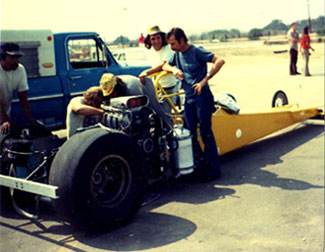 |
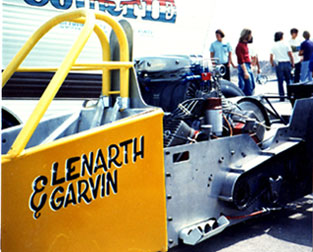 |
Here's another Lenarth car of somewhat lesser renown (and much lesser success), the chain-driven Lenarth & Garvin sidewinder Top Fueler, pictured at Irwindale in September 1973. The way I understand the story is that Lenarth's original plan was to build a rear-engine, chain-driven Funny Car (using, of all things, a Gremlin) and opted to put the interesting setup in this dragster first for testing purposes, but according to Morgan, the dragster crashed. Lenarth retired not long after, and the project was never realized.
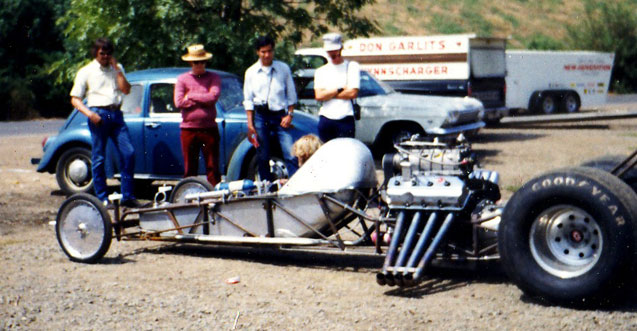 |
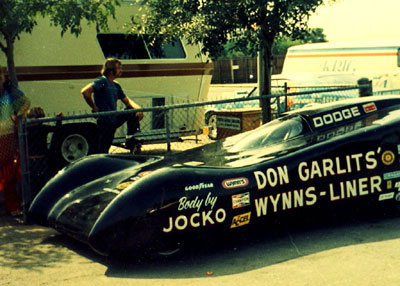 |
Don Garlits didn't make many mistakes conceiving, designing, and building winning race cars, but this one wasn't one of his finer moments, the ill-fared Wynn's Liner, also known as Swamp Rat 17, captured by Morgan in the pits at OCIR during its Sept. 15, 1973, debut at the AHRA Grand American event. These are the first photos I can recall seeing with the car sans body, and you get a real idea for how short it was.
Garlits henchman Connie Swingle built the frame, over which was cloaked a super-sexy fiberglass body by regarded aero wizard Robert "Jocko" Johnson, and "Big Daddy" had hopes of 250 and (gasp!) perhaps even 275-mph speeds — not bad considering that the best speed to that date was (dismissing some scoffed-at 246- and 247-mph time slips Garlits was given in Gary, Ind., in July) 243.90 by "Big" himself in Gainesville in 1972.
According to Garlits, "Butch Maas drove the beast to 180 mph, far off the highly touted 275 mph! We brought the car home and tested the next time at Lakeland [Dragstrip] outside of Tampa, and Don 'Mad Dog' Cook was at the controls. Still no real good runs. I then decided to drive the car myself, and to my surprise, at about 180 mph, the motor revved up and I lifted. We returned to the pits to find nothing was wrong! What had happened was that at about 180 mph, the whole car became airborne, and as the rear wheels cleared the pavement, the engine would rev up. I pulled the plug on the project."
Garlits later sold the car to rocket-car racers Russell Mendez and Ramon Alvarez, and Garlits bought it back from Alvarez after Mendez was killed during an exhibition run at the Gatornationals in a different car, their wheel-pants-equipped Free Spirit rocket dragster.
Okay, that's it for the Tuesday before Christmas. I'll have a column Friday (my gift to you!), even though it is Christmas Day, which is going to be a humorous look at National DRAGSTER's Xmas list for our racers, which I originally wrote for the Staging Light column of our final 2009 issue. OK, so I'm a regifter, but I thought I’d share with you guys and ask for your suggestions.
Til then …



